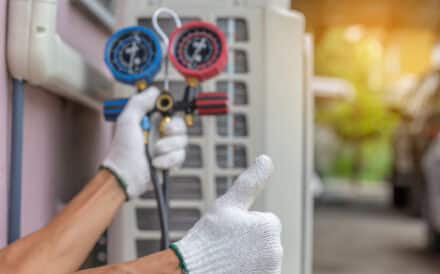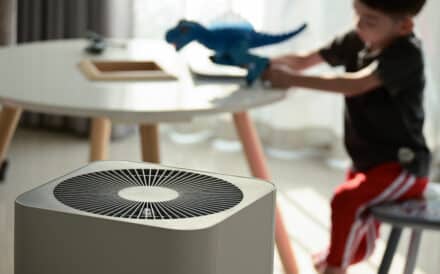Why Does My AC Take a Long Time To Cool Down the House?
Your air conditioner has been running for hours. Yet, your home still feels too warm. What’s taking so long? There are a few possible reasons why your AC might be taking longer than it should to cool down your home. Everyone deserves to have a cool and comfortable home on hot summer days. Let’s take a look at the common causes of slow cooling and discuss how regular HVAC maintenance can help your system work more efficiently.
How Long Should Your AC Take to Cool Your Home?
How quickly your AC cools your home isn’t the same for everyone. Several key factors determine your cooling time.
Insulation Quality
Proper insulation acts as a barrier that keeps cool air in and hot air out. If your home has poor insulation, heat will continuously seep in, forcing your AC to work overtime with little progress. When you schedule regular HVAC maintenance, technicians will inspect your insulation to make sure it’s doing its job properly.
Home Size and Layout
A larger home naturally requires more time to cool than a smaller one. Open floor plans may also take longer to cool than homes with separate rooms that can be cooled independently. Multi-story homes present additional challenges as cool air needs to reach upper floors against the natural tendency of heat to rise.
AC Unit Size and Capacity
Your air conditioner needs to be properly sized for your living space. An undersized unit will run constantly but never adequately cool your home. Conversely, an oversized unit might cool quickly but cycle on and off too frequently, causing wear and tear while failing to properly dehumidify your home. Professional HVAC maintenance includes verifying your system is appropriately sized for your space.
Reasons Your AC Is Taking Too Long to Cool
If your air conditioner is struggling to cool your home efficiently, here are the most likely culprits.
1. Your Air Filters Are Dirty
When air filters become clogged with dust and debris, airflow becomes restricted. This makes your AC work harder while delivering less cool air to your home. Changing your air filters about every 30-90 days is one of the easiest HVAC maintenance tasks you can perform on your own to keep your system running effectively.
2. Leaky Ducts
A hose that’s riddled with holes wouldn’t exactly do a great job of watering your garden, right? The same goes for your ductwork. Cracked or disconnected ductwork allows cool air to escape into attics, crawl spaces, or inside walls before ever reaching your living spaces. And that means you’ll be paying for cool air that you never get to enjoy! By scheduling routine HVAC maintenance visits, you’ll ensure any potential leaks are spotted and sealed by a technician to keep your cool air heading exactly where it should go: to you.
3. Dirty or Clogged Air Ducts
Your AC’s air ducts are responsible for delivering cool air throughout your home. Over time, they can get clogged with dust and debris, preventing cool air from traveling through and out of your ducts. Sometimes the problem is even simpler. Furniture or drapes might be blocking your vents, which will also keep that cool air from entering your rooms. A good HVAC maintenance check includes making sure these ducts are clear and flowing freely.
4. Refrigerant Leaks
Refrigerant is what makes cooling possible in your AC system. If your system has refrigerant leaks, it simply can’t cool the air properly before sending it through your vents. This not only leaves your home warmer than it should be, but it can also cause serious damage to your compressor over time. Refrigerant levels, as well as signs of leaks, are checked during your HVAC maintenance appointment, which is an essential part of avoiding costly repairs and keeping your system running efficiently.
5. You’ve Put Off HVAC Maintenance
Like that tiny leak under your sink that eventually damages your cabinet, small AC issues always start out minor. But without regular attention, these little problems can snowball into serious headaches. Parts naturally wear down, connections work themselves loose, and before you know it, your system is working twice as hard for half the cooling. That’s why regular HVAC maintenance is so valuable. You’ll catch these small issues while they’re still small, saving your comfort and your wallet from a much bigger hit down the road.
Simple Steps for Improving Your AC’s Efficiency
There’s good news. With a little care and TLC, you can help your AC cool your home faster and more efficiently. Bi-annual HVAC maintenance should be at the top of your to-do list as it’s truly the most important thing you can do for your system’s performance. Professional technicians will clean, inspect, and tune up your system, catching small issues before they develop into larger (and more expensive!) problems.
Make it a habit to check and replace air filters every 1-3 months, depending on your home’s conditions. This is a quick 5-minute task that can greatly improve airflow, boost efficiency, and lower strain on your system. Don’t forget about your outdoor unit either. You’ll want to keep it clear of leaves, grass clippings, and plants by maintaining at least two feet of space around it. When needed (with the power off), gently rinse the unit with a hose to remove accumulated dirt and dust. Finally, consider installing a smart thermostat that can learn your schedule and preferences, automatically adjusting temperatures to reduce strain on your system while saving energy. Most homeowners find that a smart thermostat pays for itself through energy savings within the first year.
Professional HVAC Maintenance Makes All the Difference
Scheduling regular, twice-annual HVAC maintenance visits will do so much more than just improve your AC’s ability to cool your home, as it helps extend your system’s lifespan, reduce your energy bills, and improve your home’s air quality.
Stay cool with Silver State by contacting us 24/7 for HVAC assistance at (702) 763-9451 or click the “Book Now” button at the top of this page to schedule your appointment today.




